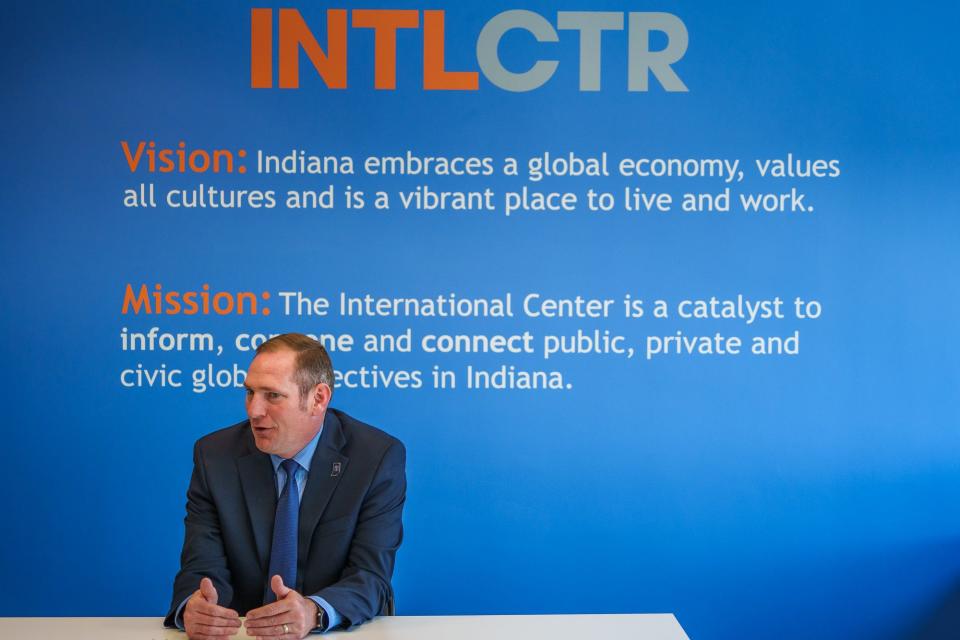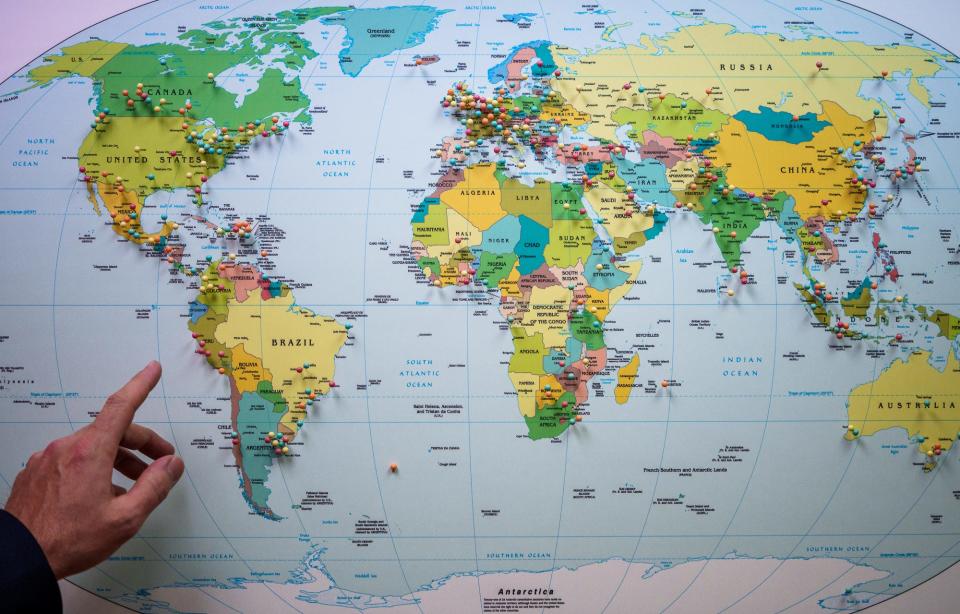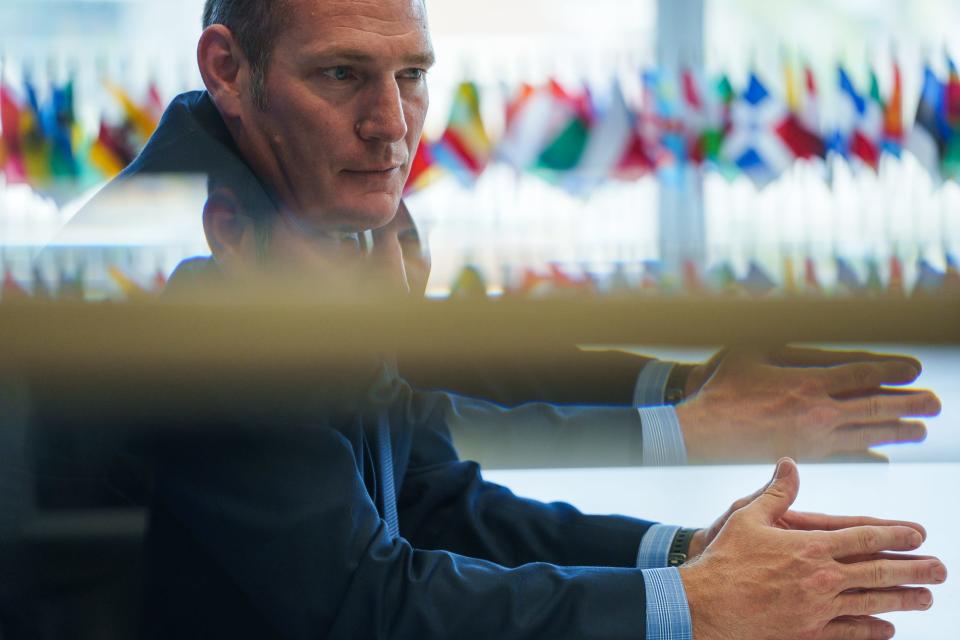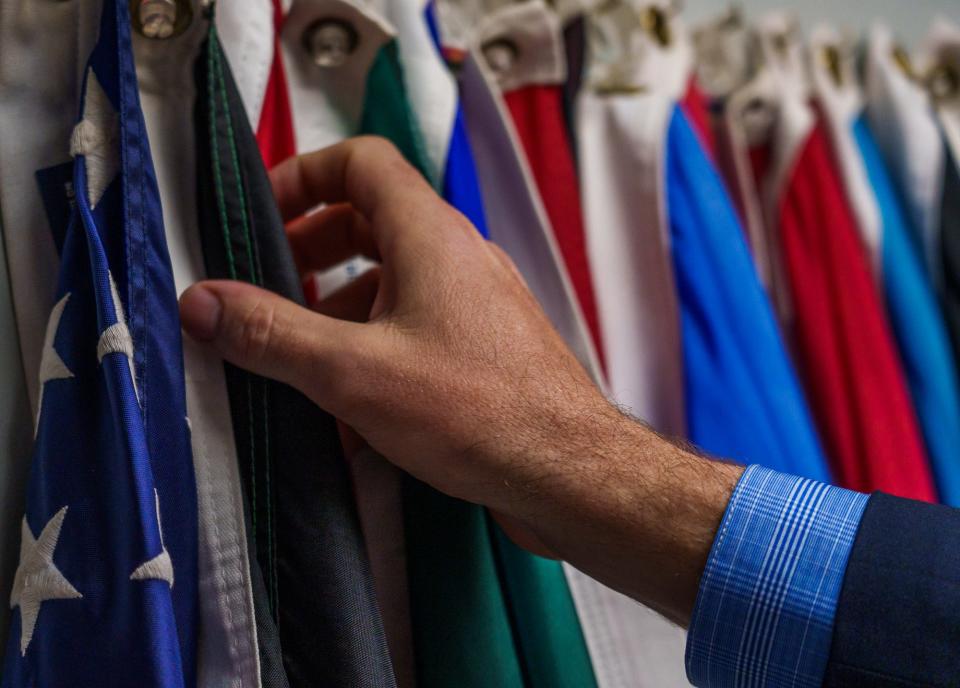As 'Chief of Protocol,' Peter Kirkwood helps bring Hoosier hospitality to the global stage
The nerves before an important first meeting might sound the same in any language.
Eyes locked. Arms reached out. Wait, are we going for a handshake or hug? Or now in COVID times … should we elbow bump?
If anyone can answer those questions or calm those anxieties, it’s Peter Kirkwood.
“It's that first impression,” Kirkwood said, “so it means so much.”
As Chief of Protocol for the International Center, an Indianapolis-based nonprofit organization, he’s tasked with briefing Indiana leaders before they meet with foreign dignitaries and visitors.

He works with the Governor’s office, Chamber of Commerce, mayors, economic development officials and others across the state. Kirkwood and his team may brief them on a country’s basic biographical profile, or they might offer guidance on the appropriate cultural greeting for a guest.
His work is a reflection of Indiana’s increasing globalization — with growing immigrant populations and a sharper focus on securing foreign investments — the state has an important stake in staying connected with the world.
"Indiana has connections to every corner of the world," Kirkwood said. “When we think about Hoosier hospitality, we're very good at casual, (and) receiving and accommodating. “With ‘protocol’ … we're able to show Hoosier hospitality on the global stage.”
More: These are where Indiana's immigrant communities come from
The importance of protocol
Kirkwood often tells important people what to do, from where to stand to how to shake hands. It's "kind of neat," he admitted, but it requires establishing trust.
"It could be a country or culture that I've worked with many times before," Kirkwood said. "I still go back to my reference materials and double-check that my assumptions are true."
He may advise clients, for instance, that when greeting guests from China, the head of the American delegation should welcome the head of the Chinese group — leader to leader — first and foremost. Unlike a traditional American handshake, this one should be more light and lingering.
“We would advise on returning the grip that is given,” Kirkwood said. “Sustained contact until your counterpart releases.”
With guests from the U.K., while the handshake is similar to the U.S. — firm, with direct eye contact — the host should greet everyone in the room, Kirkwood said. And after the meeting, when the general tendency is to jump up and rush goodbyes, it’s important to take time to say a proper farewell to each person.
Even gift-giving has nuances and symbolism based on different cultures.
More: Italy to French Lick: Where Hamilton County mayors traveled in 2021 — and what it cost
Briefing people on customs ahead of time helps manage expectations, according to Kirkwood. It doesn’t guarantee that the meeting will be flawless or that both parties will agree on everything, but it sets the stage for a productive conversation.
“It’ll remove the distractions so that you can focus on building that relationship in the moment,” Kirkwood said. “As opposed to having your mind wander off to … ‘What is the meaning behind a light and lingering handshake?’”
His guidance helps inform the work by the Indiana Economic Development Corporation (IEDC) and other state leaders, according to Jillian Turner, IEDC's vice president of international programs.
“From advising on business protocol for foreign trips to researching Ukrainian diaspora communities in Indiana, Peter works under tight timelines with the upmost professionalism," Turner said. "We are endlessly grateful to have him and the International Center in Indiana.”
This type of work is crucial in various industries, not just politics, according to Melissa Werner, president of Protocol & Diplomacy International — Protocol Officers Association (PDI-POA). The organization has about 400 protocol professionals, primarily based in the U.S. and Canada, and they've seen membership grow in recent years, Werner said.
"A lot of that kind of interaction happens behind the scenes. People don't necessarily notice it," Werner said. "But if it's not done well, it can really be quite ruinous for a budding relationship."
"If we're doing our jobs well," Werner added, "you don't know that we're there."
From oyster roasts to hors d'oeuvres
As a young boy, Kirkwood didn't dream of decorum or proper protocol.
He grew up in rural North Carolina — "very much no shirt, no shoes, no problem, whatsoever," he said — but a move to Japan in his teenage years gave him an early taste of his current career. Back then, his father, a lieutenant colonel, and his step-mother, a Department of Defense employee, introduced him to the formalities of military life.
"I can still tell you that my dad was the reserve liaison officer for the Third Marine Expeditionary Force at Camp Courtney," Kirkwood said. "As an officer's son, you're expected to be able to introduce yourself and your parent in those appropriate titles."
It was a learning curve, going from messy, family oyster roasts in the South to passing out hors d'oeuvres at wine and cheese parties in Japan. But the experience led him to study Japanese and Anthropology at Ball State University.
He eventually received special credentials from the International Society of Protocol and Etiquette Professionals to become his organization's first protocol officer in 2008, when they saw a growing need for a full-time person committed to this work.

While there is formal education offered through schools, it's not required to work in the protocol space, Werner explained. People can rely on real-world experience and connect with other professionals for guidance, too.
"Protocol officers exist in a lot of different areas," whether it's at universities, levels of governments or businesses, Werner said. "They don't necessarily have the title."
In Indianapolis, since beginning protocol work, Kirkwood has welcomed visitors from nearly 100 countries, he estimated, including kings, ambassadors, and Nobel laureates.
Recently, he and his organization welcomed guests from Kazakhstan, Kyrgyz Republic and Uzbekistan, who were visiting as part of a U.S. State Department exchange program to learn about religious freedom here.
What a way to relaunch in-person #IVLP in Indiana!
We just hosted 5 visitors from Kazakhstan 🇰🇿, Kyrgyz Republic 🇰🇬 & Uzbekistan 🇺🇿 as they learned about religious freedom in the U.S.
Read all about their visit and learn more about the local resources that hosted them!
🧵1/5 pic.twitter.com/kvrhXRdJSN— International Center (@INTLCTR) May 4, 2022
Citizen diplomacy ensures 'people-to-people' connections
The handshakes, gifts and photo ops are part of the game, but international diplomacy is ultimately an art and science, Kirkwood said. And while the federal government is the biggest player, individual cities and states can join in, too.
"It's an opportunity to see different solutions to shared problems, as well," Kirkwood said.
At the state level, Governor Eric Holcomb recently went on his 11th economic development trip abroad. visiting Sweden, the United Kingdom and Monaco. The trip, paid for by private donations to the Indiana Economic Development Corporation, focused on meetings with companies like Rolls-Royce and Saab, which opened a manufacturing facility in West Lafayette in 2021.
More: Gov. Holcomb meets with Ukrainian refugees during Slovakia economic development trip
More: Rolls-Royce initiates $400M investment to upgrade Indianapolis, West Lafayette facilities
#INUnitedKingdom | Last year, @RollsRoyce recently completed a $600 million investment to modernize equipment and technology at the company’s Indianapolis facilities. This investment marks Rolls-Royce’s single largest investment in the U.S. within the last 25 years. 🇬🇧 pic.twitter.com/rJPhBg8Kk6
— Governor Eric Holcomb (@GovHolcomb) April 28, 2022
The opportunity to engage globally falls down to Indiana residents, too.
"In citizen diplomacy, every individual has the right if not the responsibility to shape U.S.-foreign relations," Kirkwood said. "It helps to sustain relationships so that they don't have to fluctuate from administration to administration."
He points to the Sister Cities International program as an example, created by President Dwight Eisenhower to foster peace and encourage relationships between regular citizens around the world. Indianapolis has nine sister cities, including Taipei, Taiwan and Monza, Italy.
“It's a peace building mission,” Kirkwood said. “If we have these people-to-people connections, when the atrocities of war (occur), like we're seeing in Ukraine currently, we have those connections. Whether it be for community-building, humanitarian assistance or information exchange.”
The visitors from Kazakhstan, Kyrgyz Republic and Uzbekistan, for instance, visited the Marion County Prosecutor’s Office to learn about their hate crime hotline.
In late May, the International Center welcomed the Ambassador of Portugal, who gave local government and economic development leaders a presentation on the benefits of doing business in Portugal.
Protocol helps bring people together
When he's not giving guidance on meeting and greeting, Kirkwood's work is focused on decorum, such as setting up flag displays.
Recently, at the Indiana Center Convention, he looked over a sea of empty chairs and inspected a set of African flags across the room.
“I don't think they’re even,” he noted.
He’d have to go back and shift each one about a foot to the left, one last tweak to ensure the room looked perfect before a commencement ceremony celebrating Black graduates at IUPUI.
They're symbols, but Kirkwood would argue they're just as important to making people feel welcome and respected in a space.

“Most people don't look at flags like I do,” Kirkwood said. “You really step back and you see how much is packed into these 3x5 symbols.”
Walking by a red, white and blue flag, for instance — not an American flag, as one might assume on quick glance — he explains how Liberia was founded by former U.S. slaves. Looking at the green and yellow stripes of Togo’s flag, he can tell you the official language is French. In his office, he picks up the triangular flag of Nepal and notes its similarities to the state flag of Ohio.
(And yes, he can recognize and name all the national flags of the world.)

“There's days where we've been setting up flag displays and working on getting it just right," Kirkwood said. "I think to myself, ‘Does anybody care that I’m doing this?’”
But then, the event starts and the room fills up. He sees people point and take photos and light up with recognition of certain flags.
“Where we arrange flags, we also arrange people.”
Contact Rashika Jaipuriar at rjaipuriar@gannett.com and follow her on Twitter @rashikajpr.
This article originally appeared on Indianapolis Star: 'Hoosier hospitality' comes to global stage with 'Chief of Protocol'

